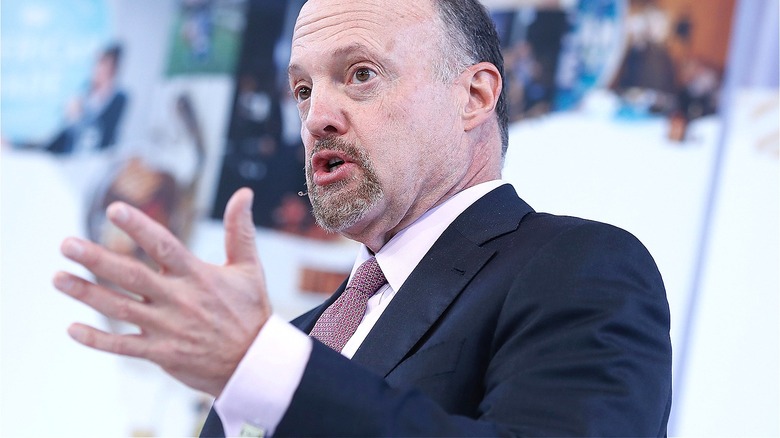Financial Advice From Jim Cramer You Should Be Listening To
Great financial advice comes from all corners. Experts and experienced traders, savers, and consumers have developed a wide range of tactics and techniques to get the most out of their savings accounts and budgets. Building a solid budget, of course, stands as the bedrock of any useful fiscal strategy, but where you go from there can take many different forms. Jim Cramer, the longtime host of "Mad Money," is a fountain of great ideas surrounding budgeting, saving, and indeed, investing. While Cramer has seen his fair share of poor calls in the past, much of his financial advice revolves around common sense thinking and highly rewarding strategies that can make all the difference in your own money management.
Many of Jim Cramer's principled views on financial management focus on stability and longterm thinking. He prioritizes multiple investment avenues and diversification while championing strategies of maximum impact. He's long been a frugal spender, even as a multimillionaire worth an estimated $150 million (as of 2022). These nuggets of financial wisdom come straight from the investment personality and former hedge fund manager, and can make a positive and lasting impact in your life that stretches long into the future.
Think about future college expenses early on
Jim Cramer specifically advocates for a 529 education savings plan, which presents a great way to save money for college. There are two main approaches that parents can consider when setting aside cash for a child's education, but the education savings plan is the more versatile structure. Instead of the prepaid tuition option that allows you to purchase credits at today's rate, an education savings plan acts like a tax-advantaged investment portfolio that can be drawn down penalty-free in years to come when paying for qualified education expenses. Cramer notes the shift in public policy surrounding educational expenses, with particular focus today being given to existing student loans. He reckons that the structure of tuition payments may be substantially different in the future, negating the value a prepaid tuition plan has to offer.
Jim Cramer is also an advocate for starting as early as possible when saving for a child's college expenses. In this tax-advantaged investment vehicle, you'll be able to grow the value of your portfolio without having to worry about the IRS taking its cut later down the line. It's a great way to reduce the overall tax burden on the money that you earn and want to use for future expenses. Cramer and others aren't shy about their belief that saving for college should begin even when a child is just a toddler. With a 529 plan in place, you'll get even more bang for your buck.
Refrain from splurging unless it creates true value in life
Jim Cramer is a famously frugal spender. He's prioritized saving and investment for much of his life, and even now as a multimillionaire, he isn't one to be seen splashing his cash very frequently. He's stringently against frivolous spending when out and about, claiming in particular, "I will not spend money on liquor," when dining out. In his understanding, the markup restaurants add to alcoholic beverages is so substantial (typically, as much as 30%), that he has simply cut drinking in public places out of his mindset. He's not known specifically as a sober individual, but simply looks to avoid extravagant spending in any way that he can.
Cramer is also someone who famously doesn't splash out when attending public events. He's a man who likes going to hockey and baseball games, but he'll only dig deep into his bank account to buy luxury box tickets when going to see the Eagles, his favorite NFL team. While he enjoys live sports, he finds that upgraded seats don't typically add much value to the experience.
These are examples any consumer can't take and apply to their own life. Investing in high-dollar items and experiences that enrich your life substantially can be a quality use of money, but if something doesn't provide overwhelming value, then it may be a better idea to opt for a cheaper alternative.
Focus on eliminating high-interest debt first
When it comes to high-interest debt, Jim Cramer is of the same mindset as Dave Ramsey and many others in this realm. He suggests that high-interest debts – namely those racked up on credit card accounts — charge more money every month than you can expect to earn in returns on your own investments. As a result, it's crucially important to eliminate these financial burdens as quickly as possible. For Cramer, this means getting serious about paying off debts before going all in on investment opportunities.
Cramer and many others correctly identify "bad debt" as one of the most visceral challenges consumers face. These debts work hard to keep people poor, and they made credit card companies and other financial institutions exceedingly rich in the process. It's simply impossible to dig your way out of a financial hole or execute a long-term strategy for financial stability without addressing high-interest debts that do nothing but cost you an obscene amount of money on a monthly and yearly basis.
Invest in two discrete buckets
Jim Cramer is a huge advocate of investing for retirement as early as possible. He's joined by a veritable chorus of voices in this position. But he makes it clear that investors should be sinking their money into two different investment accounts as they plan for the future. Cramer identifies the reality that there are multiple forms of investing, with retirement assets forming the longest term possible and other investment profiles settling somewhere between medium- and long-term assets.
Investments placed into a retirement account can't be withdrawn early without penalty; this means that any cash you store away in a 401(k), Roth IRA, or traditional IRA should be considered untouchable until you turn 59 ½ years old. But life doesn't wait around for you to age into your golden years, so you should look to also invest in a low-cost brokerage account that's easy to trade with and equally simple to deposit and withdraw funds from.
Today, most standard brokerage accounts trade with little to no fees and linking bank accounts is a virtually seamless process. In addition to retirement savings, it's an essential task to find a shorter-term investment vehicle that you can grow wealth with while retaining greater liquidity over the funds.
Lastly, don't forget about diversification
Lastly, Jim Cramer is strident in his defense of portfolio diversification. Whether you're an investor interested in dipping toes into multiple asset classes like bonds, real estate, or even gold bullion investments, or you're a strict stock trader, diversification is crucial to portfolio health.
Investing across a wide range of assets or classes will protect you in the event of a downturn in the market. Changes in market conditions are inevitable, and a series of bull and bear runs have continued to rear their heads throughout the history of trading. While there isn't any specific formula for developing diverse stability that can outlast any kind of market challenges, Cramer says that installing diversification into your portfolio "makes it easier to stay in the game when one particularly popular group gets put through the meat-grinder" (via CNBC).
Portfolio diversity helps smooth out downturns in the market. Of course, you're less likely to enjoy astronomical returns on your overall investment, but the chances of correctly picking a stock and seeing it blow up in value are virtually nonexistent in comparison to the inevitability of a market retraction or even a prolonged bear trading period. Diversification minimizes losses, a crucially important feature in any intelligent investor's holdings.





